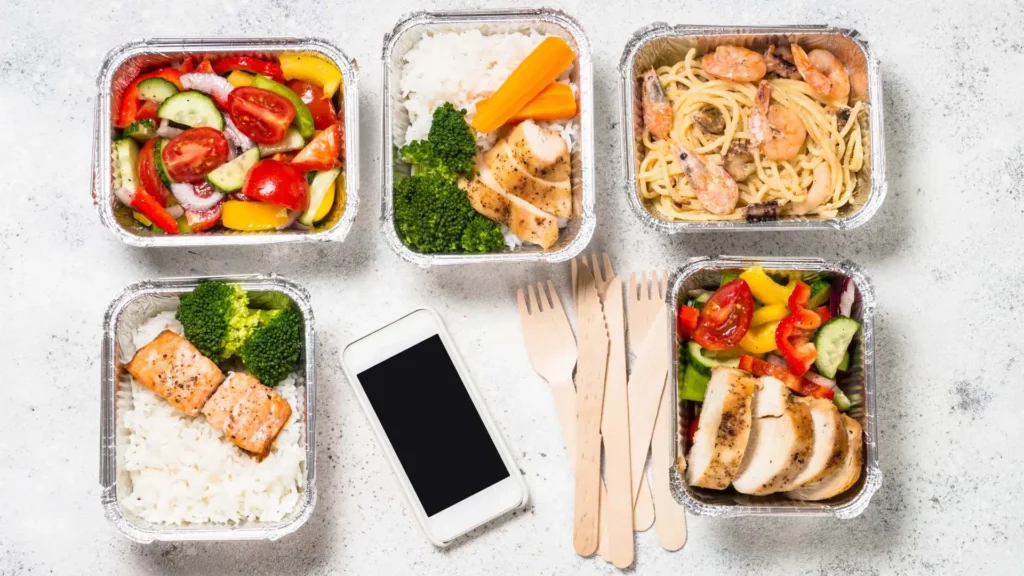Eating well and balancing studies and social life on a limited budget can be tough. Cooking every day can be tiring, and fast food adds up quickly. But what if you could have all of the above without the daily hassle?
Meal prepping is the easiest hack for students — saving money, time, and stress. Whether you share a dorm microwave or have the luxury of access to a full kitchen, these meal prep ideas will keep you on track while going easy on your pocket. With a little planning, you can have home-cooked, eat-on-the-go meals all week for less than takeout.
With Blitz, saving on food is even simpler. This AI-powered app helps you shop smarter by finding the best student discounts, cashback offers, and exclusive deals. It helps source ingredients for affordable meal prep ideas for students.
From fast breakfasts to no-cook lunches and dinners, this guide provides tips to cook up budget-friendly plan meals for the week in a simple way. No-fuss recipes, no pricey ingredients — just smart, tasty meals that suit a student’s schedule.
Why Meal Prep is a Game-Changer for Students
College life is busy. It’s hard to find time to cook every day. Restaurants can be expensive, and careless snacks aren’t much better. Meal prep saves time, money, and energy while being ready for good food to eat.
Saves Time
Eating ready-to-eat meals saves time that you could be using for studying. With meal prep, your food is already made. You heat it and eat. It saves effort, letting you focus on what matters without worrying about daily cooking.
No Last-Minute Stress
During a busy week packed with numerous assignments and classes, figuring out what to eat can be a real challenge. Prep work eliminates that stress by providing meals that are ready to consume instantly.
Reduces Food Waste
When you pick up groceries without a plan, you tend to waste food and cash. Meal prep makes it easier to buy only what you need and use things up before they spoil. Preparing meal plans trims excess grocery spending and maximizes your monthly budget.
Makes Life Easier
Meal prepping a few times during the week makes life much more organized. Managing daily meals can be a headache, and setting them aside alleviates this problem. Having the meals planned means your day will flow more easily, and there will be no last-minute meal complications.
Read: How to Make Money as a Broke College Student?
Top Budget-Friendly Meal Prep Recipes
Eating well doesn’t have to be costly or time-consuming. A little planning can go a long way and help you prepare tasty, filling meals that won’t break the bank. These affordable meal prep ideas are healthy and quick to make, with simple ingredients to keep you satisfied:
Overnight Oats
Overnight oats are a quick breakfast. Combine oats with milk and something like honey or maple syrup in a jar. Stick itin the fridge overnight and it’s ready to eat in the morning. For added flavor, include fruits, nuts, or peanut butter.
Rice and Beans Meal Prep
Rice and beans are a perennial budget lunch rich in protein and fiber. Make a large batch of rice and combine it with black beans, kidney beans, or lentils. Additional seasoning can be garlic, cumin, and chili powder for flavor.
Stir-fry with Frozen Veggies
Stir-fry a quick and nutritious meal. Use frozen vegetables to save on costs and prep time. You can toss them with soy sauce, garlic, and a protein — chicken, tofu, or eggs. Serve over rice or noodles for a hearty meal.
Egg Muffins
Egg muffins make an excellent grab-and-go breakfast or snack. Whisk together eggs, stir in veggies, cheese, and seasonings, pour into a muffin tin, and bake. Store them in the fridge and zap them when you want a quick meal.
Check this out: Best Ways to Earn Extra Cash While in College
How to Plan Your Meals for the Week
Meal planning simplifies your life. You can skip those last-minute food runs and overspending on takeout. Here are simple steps:
Pick Easy and Flexible Meals
Plan meals that are easy to make and require few ingredients. Pasta, stir-fry, and rice bowls are ideal options. It’s easy to substitute ingredients, so if one thing is too expensive, you can replace it — I get just what I need in the amount I need it.
Stick to a Grocery List
Impulse purchasing results in spending too much and wasting. Make a list of what you need before going shopping and follow it. It keeps your spending within the budget and ensures you purchase only items you will use. A list is also a time saver and prevents impulse buys.
Cook in Batches
Cooking food in large quantities at once will save you precious time and effort. Prepare several meals and place them in containers. This way, batch cooking reduces food that will be thrown away and saves on grocery bills.
Store Food the Right Way
Store food in airtight containers to extend freshness. Label meals with expiration dates to know when they have to be eaten. Sustain some meals in the refrigerator over a few days and freeze extras for later. Good storage saves you from waste and keeps food delicious.
Prep Snacks and Breakfast Too
Meal prepping doesn’t stop at lunch and dinner. Chop fruit, portion out nuts, or prepare overnight oats ahead of time. Having snacks and breakfast on hand makes morning routines easier and eliminates spending on unhealthy options when you’re in a rush.
Set a Meal Prep Day
Pick one day during the week to cook or prepare meals. Sundays work best, but any day that fits your schedule is fine. When followed religiously, this process can become a habit—a good one to have, considering how convenient it will be for you throughout the week.

Shopping Tips for Meal Prep on a Budget
Grocery shopping doesn’t need to be overly expensive. With the right plan, you can overfill your cart without having to worry about the total. You can adopt a few strategies that will help you save money while shopping for meal-prepping.
Buy in Bulk
Purchasing larger amounts of staple foods is a money saver. Rice, beans, pasta, and frozen veggies are cheap and last a long time. Disposable containers use less packaging, so they become cheaper. For the best deals, look for bulk bins or larger packs at warehouse stores.
Shop Store-Brand Items
Store-brand products are often just as good as the name brands but less expensive. Most grocery stores have their versions of staples such as cereal, peanut butter, and canned goods. So, compare prices and choose the budget-friendly option.
Use Student Grocery Discounts
Many grocery stores give student discounts with a college ID. Some have special discount days or savings programs. By signing up for loyalty programs, you might get some additional discounts. Always check if your local store offers student perks to lower your food costs.
Check Weekly Sales and Coupons
Most grocery stores advertise weekly sales that allow shoppers to save broadly on grocery essentials. Look to store flyers and sites before you go grocery shopping so that you can prepare accordingly.
Compare Prices at Different Stores
Not all grocery stores charge the same for an item; prices vary. For better rates, check prices at different stores and on price-matching apps. Discount stores and wholesale clubs typically have lower prices on staples.
Essential Kitchen Tools for Meal Prep
For meal prep, having the right tools makes things easier and faster. You don’t need costly gadgets or a fancy kitchen. Basic tools can help you create tasty budget meals with ease. Here are some essential tools for meal prep.
Slow Cooker or Instant Pot
A slow cooker enables you to prepare meals without hours of labor in the kitchen. Simply add ingredients, set the timer, and let it do its thing. It’s great for soups and stews, rice dishes, and shredded chicken for wraps or sandwiches.
Food Storage Containers
Good storage containers will keep meals fresh for days. Use reusable, leak-proof containers that fit easily in the refrigerator or bag. It’s best to use glass or BPA-free plastic containers.
A Sharp Knife
A good knife makes chopping veggies, slicing meat, and dicing ingredients faster. A sharp knife is safer than a dull knife because it needs less force. For most meal prep work, a simple chef’s knife works great.
Cutting Board
A solid cutting board will protect your countertops and make chopping easier. Plastic boards are easy to clean, while wooden ones will last for years if cared for. Use separate boards for meats and veggies so food stays safe and doesn’t cross-contaminate.
Non-stick Pan or Skillet
A good non-stick pan makes cooking eggs, pancakes, stir-fries, and grilled cheese much easier. Food won’t stick, and cleanup takes seconds. It’s also great for small dorm kitchens or shared spaces with limited stovetop access.
Read: Savings Rules for College Students
Key Takeaways & Next Steps
Meal prepping is a simple technique that saves money, helps you eat better, and reduces mealtime stress. Planning meals will prevent you from spending more on takeout and last-minute grocery runs. With a bit of effort, you can feast on home-cooked meals without emptying your wallet.
Saving money is key, and that’s where Blitz comes into play. If you’re a college student who wants a cash advance, Blitz is the app for you. With Blitz, managing finances is easier than ever—whether it’s covering unexpected expenses, planning for future goals, or getting early access to cash when needed. Download the app here.
This is a great time to get started with meal prepping. Mason jars and storage containers, plan your meals, and shop smart. Some prep today leads to more savings and less stress all week. Start right way!




